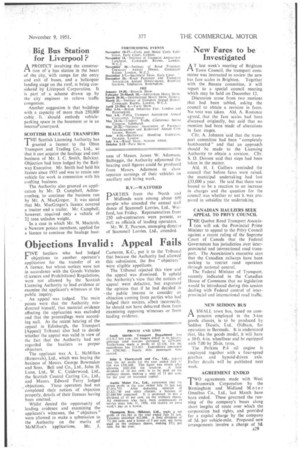Objections Invalid : Appeal Fails
Page 31

If you've noticed an error in this article please click here to report it so we can fix it.
FIVE hauliers who had lodged objections to another operator's application for the transfer of an A licence, but whose notices were not in accordance with the Goods Vehicles (Licences and Prohibitions) Regulations, were not allowed by the Scottish Licensing Authority to lead evidence or examine the applicant's witnesses at the public inquiry.
An appeal was lodged. The main points were that the Authority misdirected himself, that material evidence affecting the application was excluded and that the proceedings were according null. At the recent hearing of the appeal in Edinburgh, the Transport [Appeal) Tribunal also had to decide whether the appeal was valid in view of the fact that the Authority had not regarded the hauliers as proper objectors. The applicant was A. L. McMillan (Removals), Ltd., which was buying the business of Messrs. George Bowmaker and Sons. Bell and Co., Ltd., John H. Lunn, Ltd., W. C. Calderwood, Ltd., the Scottish Central Carting Co., Ltd., and Messrs. Edward Ferry lodged objections. These operators had not completed their notices of objection properly, details of their licences having been omitted.
Whilst denied the opportunity of. leading evidence and examining the applicant's witnesses, the " objectors " were 'allowed to make a submission to the Authority on the merits of McMillan's applications, Mr. J. Cameron, K.C., put it to the Tribunal that because the Authority had allowed this submission, the five "objectors" were eligible appellants. The Tribunal rejected this view and the appeal was dismissed. It upheld the Authority's view that the notices of appeal were defective, but expressed the opinion that if he had decided in the public interest to consider an objection coming from parties who had lodged their notices, albeit incorrectly, he should not have debarred them from examining opposing witnesses or from leading evidence.




















































































